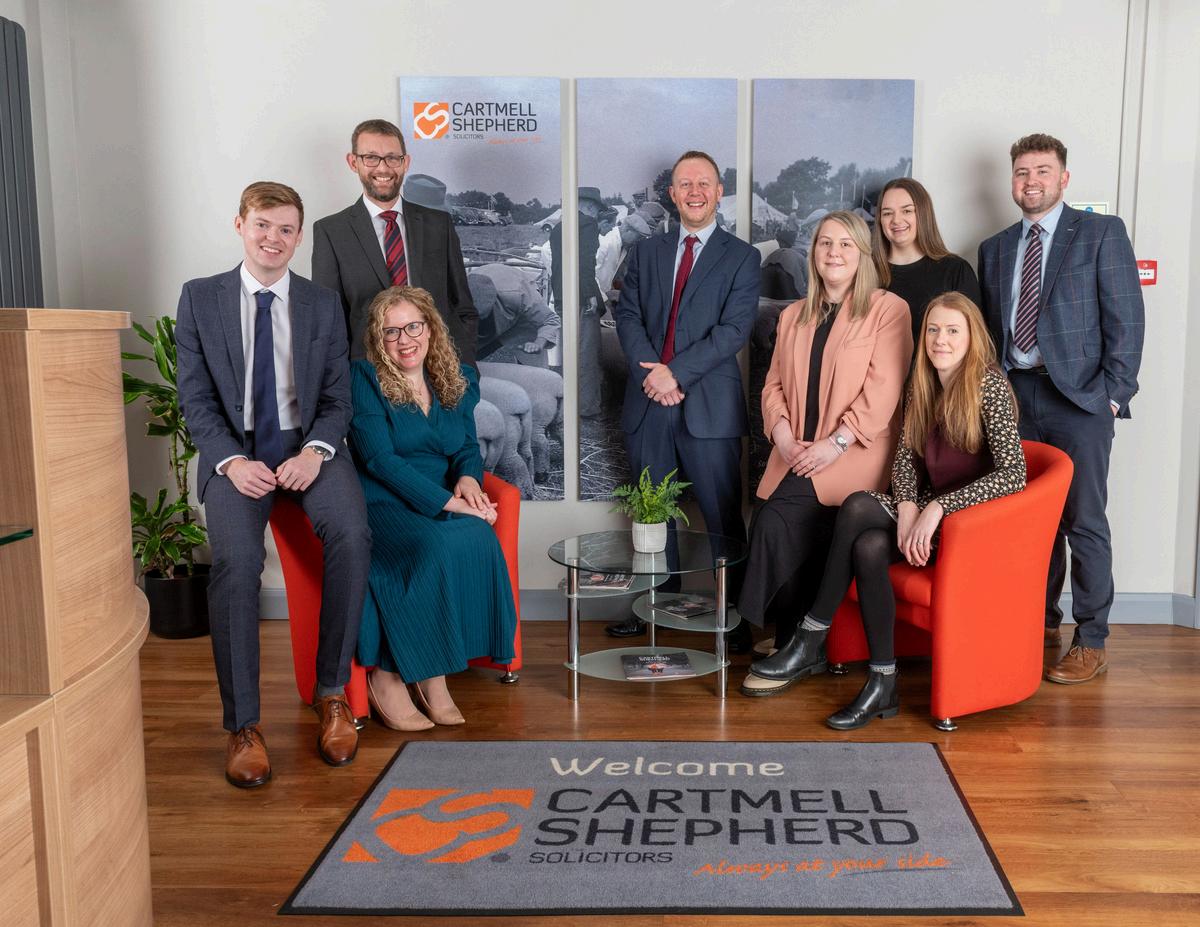
"Helping farmers thrive with expert advice”





"Helping farmers thrive with expert advice”



Jonathan Carroll Director & Head of Agriculture / Agri-business
It’s been an eventful few weeks for those in farming, either as owners or as landlords You won’t have missed the storm of protest over the Budget. Who knows if the farmer protests will have any effect, but if not then those with farms and businesses will need to plan ahead
There are some obvious things that people should do, especially those who are married or young enough to expect at least 7 years of life Wills will need altered, and lifetime planning will fast become the norm if large tax bills are to be avoided. Time for farming families to have some open conversations about succession!
So once the dust settles a little, you’re going to want to give us a call Our Agricultural team remains one of the strongest around, so I hope you will feel yourselves in good hands
Areas of Agricultural Law that our expertise covers include:
Farm & property sales & purchase
Partnership matters & disputes
Landlord & tenant law, including specialist contentious matters before the Agricultural LandTribunal & arbitrations
Commons law, including establishing of Commons Associations
Wind power and hydro-electric schemes
Basic Payment Scheme & other Grant Schemes
Sporting & fishing matters
Equestrian, including livery & land-use issues
Compulsory purchase issues
Complex agricultural wills & succession planning
Development sales & option agreements
Agri-business
For further information please click here





Holly Berwick
Solicitor


THE agriculture team at a Cumbrian law firm has been ranked as one of the best in the country for the fifth consecutive year
Cartmell Shepherd Solicitors’ agriculture team received top ranking in the prestigious Chambers UK Legal Guide 2025 which lists the UK’s best law firms and solicitors
The industry recognition comes less than a month after the department retained its Band 1 rating in The Legal 500 professional law rankings
Director Mark Jackson was one of three team members singled out for praise in the Chambers Guide which cited the firm’s ‘longstanding expertise across agriculture and rural areas ’ and its ‘efficient, knowledgeable and courteous’ lawyers
Mark said: “To be recognised as one of the best rural property teams in the country is testament to the knowledge, expertise and dedication of the whole team
“Many of our team are part of the rural community so are uniquely placed to understand the challenges our clients face on a daily basis
“We’re proud to follow in the footsteps of Tim Cartmell and others who came before us at the firm and we are committed to developing the next generation of agricultural solicitors through our thriving trainee solicitor and apprenticeship programme ” Head of department, Jonathan Carroll and Director Katherine Pretswell-Walker were also name checked in the Chambers Guide Both started their careers as trainees at Cartmell Shepherd and have progressed to directors at the legal firm Cartmell Shepherd’s agriculture department is one of the biggest in the north of England, with 11 staff dedicated solely to rural property work The team has been strengthened in the past six months following the firm’s acquisition of Nicholson Portnell Solicitors which added the expertise of solicitor Simon Jewitt to the team
Mark said: “I am very proud of the achievements of the team in the last few years and particularly the way in which our associate solicitors Bethan Griffiths, Emma Blamire and Holly Berwick have worked hard to become outstanding agricultural specialists The team has been strengthened further this year with the addition of the very capable Sam Fawcett and Joseph Halvorsen as trainees, who I am sure will become the next generation of agricultural lawyers in time ”
A DEAL bringing together two highly respected legal firms has been agreed
Cumbrian-headquartered Cartmell Shepherd Solicitors has acquired Northumberland-based Nicholson Portnell Solicitors in a move which will strengthen the services both law practices provide to their growing client bases
The acquisition strengthens Cartmell Shepherd Solicitors’ presence in the North East as it already has an office in Haltwhistle, in Northumberland The firm also has five well-established offices across Cumbria with bases in Carlisle City Centre, Rosehill Industrial Estate in Carlisle, Cockermouth, Penrith and Brampton
The amalgamation will ensure existing Nicholson Portnell clients and the wider North East community will benefit from a broader range of legal expertise and resources with access to specialist agricultural, employment, dispute resolution, private client, business services and family law teams
Peter Stafford, the Managing Director of Cartmell Shepherd Solicitors, said: “Nicholson Portnell has been providing trusted legal and advice guidance to North East communities for decades and we are delighted that we have come to an agreement where we can combine the excellent services both legal practices provide for the benefit of our clients and our teams
“This deal is a major milestone in both firms’ long histories and will bring many benefits through our shared values and our shared vision for the future
"Joining forces with Nicholson Portnell will help strengthen our presence in the Tyne Valley and Northumberland and support and enhance the great work both teams carry out on a daily basis "
Nicholson Portnell was formed in 2003 following the merger of law firms Nicholson Wood & Gregg and Portnell Ward & Rose
Senior Partner at Nicholson Portnell, Richard Nelson, was a partner with Portnell Ward & Rose prior to the amalgamation, and he said he was excited about the opportunities being associated with Cartmell Shepherd Solicitors would bring for Nicholson Portnell
“We are delighted to be coming together with such a prestigious, well-established firm like Cartmell Shepherd Solicitors, with whom our values and ethos are very much aligned,” said Richard, who will become a Senior Partner at Cartmell Shepherd
“Cartmell Shepherd is passionate about the welfare of its staff and supporting career progression, and the importance placed on the well-being of its employees was a big factor in agreeing to join forces This is an exciting development for Nicholson Portnell and we look forward to providing enhanced legal services to our clients from our iconic building in Hexham town centre ”
Cartmell Shepherd Solicitors works with clients across Cumbria, Northumberland and nationally The firm’s full range of legal services is available from all of its offices, delivered by a team of more than 90 people It is the only legal firm in Cumbria to be a member of the UK200Group
Nicholson Portnell currently employs 26 members of staff and will continue to operate from their Hexham office


Jo Grey, Associate Solicitor
WITH 90 per cent of Cumbrian businesses family-owned, it is crucial for business owners to fully understand how separation could significantly impact their livelihoods
Divorce proceedings are upsetting and difficult times for all involved, but things become increasingly more complicated where a family business is concerned
Jo Grey, a Senior Associate Solicitor at Cartmell Shepherd Solicitors, specialises in Family Law and is providing top tips for couples working together in a family business to protect themselves and their assets during separation
“Ending a marriage when a family business is involved makes things a lot more complex because everything needs unpicking in great detail The most obvious piece of advice I can offer is to seek legal advice as early as possible to reduce stress during extremely stressful times
“With divorce and family businesses, there are lots of variables including how capital and ongoing interests in the business will be dealt with, and there are also the practical considerations such as who will run it during the separation and going forward
“Couples need to decide what happens to the business - will it be sold or be transferred to one partner? The earlier you can seek legal advice and get everything in line, the less stressful things will be in sorting business interests out ”
“Even before you tie the knot - at least six weeks before - it can be advisable to enter into a Pre-Nuptial Agreement which deals with your business interests This will outline from the outset how you and your partner will organise all finances during the marriage and what will also happen in relation to financial matters in the event of separation
“These agreements are more pertinent for business owners who are either marrying later in life or entering a second marriage to protect their assets they have built up over the years
“While pre-nups aren’t legally binding, courts often give considerable weight to them when deciding the division of assets and finances especially if the marriage is short ”
Ensure the business is listed as a matrimonial asset
“Each case of divorce in family business is unique but generally the business would usually be considered a matrimonial asset This means that the enterprise will need to be valued so its assets can be divided appropriately, just as the family home, savings, investments or pensions would
Formal valuations can be expensive and there are often disagreements on what the true value is The bigger and more complex the business (for example, if there is machinery or contracts involved on top of income streams), the greater the need for a formal valuation
“It doesn’t matter if one of the parties hasn’t worked in the business If they are married and the non-working partner has supported the business owner in some way, then the business is likely to be designated as a matrimonial asset and will be divided among both parties ”
“Consider continuing to work together to save the business
“It is not always the easiest of situations, but some couples are able to continue working together in the business after divorce
“Sometimes, this is the only option available to some couples when splitting the business or taking capital out for one party may jeopardise the future of the business ”
Don’t do anything hasty which may land you in trouble
“If the marriage does end acrimoniously, it is important not to immediately terminate your spouse ’ s employment It’s key to seek legal advice about ending their employment before taking action because you definitely don’t want to face an Employment Law claim on top of divorce proceedings ”
Make sure your business isn’t ‘double counted’
“It’s important in separation cases that a business isn’t ‘double counted’ - this is where the business is treated as both an income stream and a capital asset If the business provides the income which pays maintenance to the other partner and the children, then a proportionate approach to the valuation of the business is taken
“It’s necessary during separation to acquire a broad valuation of the business, but it is not always essential that an expensive and meaningless formal valuation is taken out to achieve a precise figure for a business which is unlikely to be sold as it’s required as a continued income stream ”
“While the easiest option is to divide all assets such as the family business, there are alternatives available to avoid settlements which may potentially destroy the business Instead of dividing up the business assets, examples of working solutions include:
Transferring other non-business assets, such as pensions Cashing in a pension to meet the required settlement may be financially more beneficial than dividing the assets of the company which continues to provide an income stream; Pay by instalments Instead of paying the settlement in one lump sum, the option of chipping away over the months can suit both parties’ personal circumstances;
Agree the sale of the business at a later date This has been used to good effect by farmers who want to carry on farming as it is their only source of income, and they have agreed to sell the business and share assets on retirement
“If parties can’t agree how to deal with a business following separation, then it is likely that they need to take the matter to court, which unfortunately can be an extremely costly exercise
“A judge will consider all matters and will try to preserve a working business if possible and be creative in how this is achieved - they can put in place orders to offset one party’s interests against other assets, defer payments or agree staged payments for set periods of times
“The court will also consider any agreements made by the parties including Pre-Nuptial Agreements and Declarations of Trust These are looked at by the court to meet the needs of the parties and any children ”
Jo concluded: “There are so many considerations which come into play when marriages end involving people working in business together, and every eventuality needs to be explored to make sure the best interests of all parties are met
“The solutions can often be complex and complicated, and extremely challenging both legally and emotionally, so it is vital that business disputes are handled as amicably as possible
“Support is on hand to guide people through such difficult times, and working closely with your Family Law solicitor will ensure your company is structured to protect the business from divorce where possible, making sure all parties get a fair share of all assets due to them ”
The latest Defra livestock population survey has revealed that the numbers of breeding cattle, sheep and pigs in England fell during the 12 months to 1st June 2024
Breeding cattle fell by 2 2% to fewer than 1 7 million The fall was driven by the decline in beef breeding numbers, which dropped by 5 1% The dairy breeding herd stayed relatively stable, falling by only 0 6%
The number of breeding sheep fell by 5 6% to 6 6 million, which was the lowest number since 2011 This was thought to be the result of higher prices for finished lamb earlier in the year, which incentivised farmers to sell a greater percentage of ewe lambs, instead of retaining them for breeding The total number of sheep in England also fell, by 4 3% to 13 8 million, driven by the decline in the breeding flock
The female breeding pig herd fell by 2 2% to 251,000, continuing a trend that has seen the number of breeding sows halve since 2000 Although this fall was partly driven by challenging financial conditions and technological advancements, it is also the result of reduced piglet mortality and higher pig carcass weights, which have allowed farmers to achieve higher productivity
Despite the lower numbers of female breeding pigs, the total number of pigs in England increased by 1 3% to 3 7 million, driven by a 1 5% rise in the number of fattening pigs, which reached 3 35 million
However, the total number of cattle fell, by 2% to around 5 million This was the lowest number since Defra records began in 2005 According to AHDB (the Agriculture and Horticulture Development Board), falling cattle numbers were the result of pressure on margins combined with high beef prices, which have encouraged farmers to cull more animals
The Defra livestock population survey also includes statistics relating to poultry flocks It found that the breeding and laying flock in England has remained stable in 2024, at just over 32 million However, the total number of poultry in


The British Meat Processors Association (BMPA) has warned that beef exports to the European Union (EU) could ‘ cease overnight’ on 1 January 2025 when the new EU Deforestation Regulation comes into force
The Regulation requires any trader who places beef (or derivatives of beef, such as leather) on the EU market to carry out due diligence checks along their supply chain These checks are intended to ensure that the beef has been produced without contributing to deforestation anywhere in the world, and without breaking any environmental or social laws.
According to the BMPA, the Government has done nothing to prepare for the new requirements In contrast, competitor beef-producing nations, such as New Zealand, Argentina and the US, have developed government-backed systems to ensure compliance
As a result, beef producers in the UK are at risk of losing access to the EU market, which accounts for 90% of the £580 million British beef export market This would lead to an immediate crash in the price of UK livestock, putting many farmers out of business and causing long-term harm to Britain’s food security The consequences would also include a rise in meat prices within the UK to compensate for the loss of export revenue
The BMPA has written to Defra setting out a solution that makes use of existing traceability systems in the UK. However, it has warned that this solution cannot be effective unless the Government plays its part, by communicating with EU authorities to clarify the new requirements and by appointing Defra as a ‘competent authority’ to manage compliance in the UK

The Energy and Climate Intelligence Unit (ECIU) has analysed provisional data and yield forecasts for key cereal crops in England The results, published in September 2024, reveal the heavy toll that record rainfall in winter 2023/24 had on farmers’ ability to plant and establish cereal crops
The total harvest of wheat, winter and spring barley, oats and oilseed rape in 2024 is forecast to be 3 million tonnes less than the five-year average. This represents a 13% fall in yields, making 2024 one of the worst harvests in decades
The wheat harvest alone is forecast to be more than 2 2 million tonnes, which is 18% down on 2023 In addition, there are fears that poor growing conditions caused by the wet winter and dull early summer will result in wheat not making the grade for food production
Although the harvest is predicted to be not as poor as feared in spring 2024, it will still be one of the worst since 1983 The low yields will leave the UK dependent on imports to produce bread and other baked goods
Challenging growing conditions mean that farmers in Scotland are also facing a poor harvest NFU Scotland estimated that in early September 2024, just 10% of spring barley and a small area of wheat had been harvested in the north east region
The ECIU describes farmers as ‘ on the front line’ of climate change, which is making extreme weather more likely As a result, the ECIU is encouraging farmers to become more resilient by adopting sustainable land management practices For example, planting trees and hedgerows captures carbon and reduces soil loss, which allows the land to recover from flood or drought more quickly
Defra’s latest ‘Farming and Countryside Programme’ annual report reveals that it failed to deliver £358 million of funding over three years Overall, Defra had a budget underspend of £103 million in 2022/23 and £125 million in 2021/22. According to the NFU, the under spend is due to delays implementing support schemes intended to replace the Basic Payment Scheme. The NFU has called for the Government to increase the UK agriculture budget and warned that any underspend should not be reclaimed to tackle the £22 billion ’black hole‘ in public finances

Pig prices drop to lowest level in 18 months
The average price for GB standard pigs fell to 209.37p per kilogram in the week ended 31 August 2024, down 15p yearon-year and the lowest level since February 2023 The GB pig price is facing pressure from falling EU prices, which is making UK pig imports a more attractive option
Changes to succession rights in threegeneration farm tenancies in England came into force on 1 September 2024 Under the changes, applicants are no longer ruled out because they occupy another agricultural holding that can produce a commercial return. New rules on suitability have also come into force, meaning that applicants must show that had the tenanted holding been available on the open market, they would have the necessary skills to be shortlisted by the landlord
Thousands of acres of farmland could be taken out of food production to build major solar projects The Government has approved three solar farms as part of plans to achieve its clean energy target by 2030 Large solar projects benefit from Nationally Significant Infrastructure Project status, meaning that they bypass typical local authority planning requirements As a result, the Tenant Farmers Association has warned that tenant farmers are at risk of landowners reclaiming farmland for solar projects that offer a reliable fixed income stream

Sainsbury’s launches development group for egg producers
Sainsbury’s, in collaboration with its three main egg packers, has launched a development group to support its egg suppliers. The Sainsbury’s Egg Group will oversee the retailer’s pledge to always pay its suppliers at least the cost of production for eggs The group will also aim to provide financial reassurance, along with better communication and decisionmaking to deliver improvements for its suppliers. Any egg suppliers that sign up to the group must commit to reducing carbon in their production, along with an annual carbon footprint assessment
New foundation to improve farmers’ mental health
A new foundation has been set up to help tackle poor mental health in the agriculture sector The Rural Communities Mental Health Foundation will provide funded training to help organisations better identify farmers who may need mental health support. The foundation will also provide signposting to sources of help and support and raise awareness on the importance of good mental health among young farmers.


